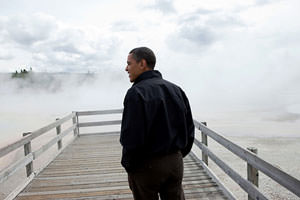Stuck in the Middle
Politicians love to run to the center, but it would be a mistake for the president or the Democratic leadership in Congress to underestimate the passion for health care reform among their party's activist base.It would be a mistake for the president to underestimate the passion for real health care reform among his activist base.
The rule among politicians in Washington used to be that when the provincials become restless, as they are now, the safest thing to do is run to the center. But as this sour and unsettled summer ends, the political center looks like the white line running down the middle of a busy street — a foolish place to stand, and an excellent place to get run over.
President Barack Obama might want to keep that image in mind, not only as he navigates the health care endgame but also as he charts his way through the rest of his ambitious and promising agenda. He is a master at threading the needle by rejecting what he calls “false choices.” But some choices are made of concrete and can only be postponed, not avoided.
It is a core belief of Washington’s political culture that policymaking by compromise — “meeting in the middle” — is the way to gain and keep the support of the vast, moderate, essentially reasonable group of voters who constitute a coherent political center. My problem with this analysis is that so many of the big decisions that have to be made are binary: yes or no. The only terrain in the middle consists of “maybe” or “kind of,” and I see no evidence that the country is in a “maybe” or “kind of” mood.
Much of the energy, passion and anger on display at the health care town hall meetings was irrational and based on ridiculous misinformation. But the emotion was real, and it reflects the fact that the far right is essentially taking an obdurate, rejectionist stance toward anything Obama tries to do.
Republicans in Congress clearly have decided that it is in their interest to keep these motivated activists within the fold — even the crazy “birthers” who deny Obama’s legitimacy as president and the militant yahoos who question his patriotism. If ever there was a chance to win Republican support for legislation providing meaningful health care reform, that moment has passed.
This makes health care essentially an intramural fight among Democrats. The party’s activist left isn’t as raucously gonzo as its Republican analogue. But it would be a mistake for the president or the Democratic leadership in Congress to underestimate the passion for health care reform among their party’s activist base.
Democrats have dreamed of universal health care since the Truman administration. Obama campaigned on a promise to deliver it, or something very close. Progressive Democrats in the House, the AFL-CIO and other key Democratic Party actors sounded as if they meant it when they warned the White House not to abandon the idea of a public health-insurance option.
In retrospect, it was probably a mistake for Obama to allow the public option to become such a litmus test. A government-run program is not a prerequisite for universal health care, as nations such as Germany, France and Japan have demonstrated. But the only reasonable trade-off for dropping the public option, in my view, would be the ability to move health insurance coverage much closer to true universality. Instead, the Senate “Gang of Six” negotiators — those trying to somehow “meet in the middle” — seem to be moving in the opposite direction.
Democrats are right to believe that they have to pass some kind of health care bill or be accused — justly, I’d say — of stunning incompetence. But what’s the point of making concessions to Republicans who, in the end, aren’t going to vote for the legislation anyway?
And as for the centrist Democrats who represent swing states and are trying to reduce the whole exercise to “reform lite,” who do they think will be most vulnerable at the polls if the reform effort fails and voters decide to punish the party? Do they think they have a chance of beating their next Republican opponents if progressive activists aren’t enthusiastic about writing checks, making phone calls and going door-to-door?
In the end, Democrats will probably reason that something is better than nothing and pass some kind of bill that can be labeled “reform.” But if it’s seen as watered-down, Obama may pay a price. Progressives have been willing to cut him slack on deepening U.S. involvement in Afghanistan, on the largess that’s been showered upon Wall Street, on not fully investigating Bush-era abuses. Those, too, could be made into binary issues — and the “center” could look even more like a tightrope.
Eugene Robinson’s e-mail address is eugenerobinson(at)washpost.com.
© 2009, Washington Post Writers Group
Your support matters…Independent journalism is under threat and overshadowed by heavily funded mainstream media.
You can help level the playing field. Become a member.
Your tax-deductible contribution keeps us digging beneath the headlines to give you thought-provoking, investigative reporting and analysis that unearths what's really happening- without compromise.
Give today to support our courageous, independent journalists.






You need to be a supporter to comment.
There are currently no responses to this article.
Be the first to respond.